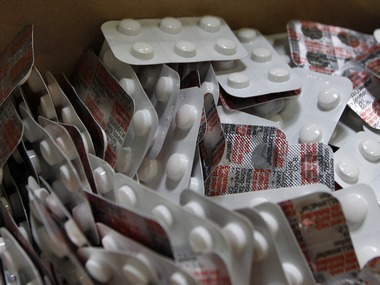India is likely to open a new front in its likely loosing battle against unaffordable patented drugs.
An inter-ministerial panel has suggested linking the prices of medicines to per capita income, a report in The Economic Times said today.
And this pricing mechanism will make important medicines cheaper by a third, the report said.
The step has to be read along with the government’s earlier reported moves like giving free medicines to the poor and starting SMS service to give cheaper alternative to patented drugs prescribed by doctors.
[caption id=“attachment_419521” align=“alignleft” width=“380”]  Compulsory licence allows a generic drug maker to manufacture and sell a copy of the innovator’s drug after paying a royalty. Reuters[/caption]
Earlier, taking on the so-called “Big Pharma” head on, India had given a compulsory licence to Natco Pharma to produce Bayer AG’s cancer drug Nexavar.
Compulsory licence allows a generic drug maker to manufacture and sell a copy of the innovator’s drug after paying a royalty.
Multi-national pharma companies had objected to this as they feared the move will set a bad precedent if other developing countries follow in the footsteps of India.
The government’s aim to give free medicines had also cut out the Big Pharma, as the scheme is likely to focus on the generics.
But while India is trying its level best to champion the cause of cheaper drugs, the developed economies are also tightening laws to squeeze low-cost copy-cat medicines.
Impact Shorts
More ShortsA report in The Times of India says the multinational companies are lobbying hard with their respective governments to curb export of generics from India and Brazil.
“Not only has the US devised new treaties to challenge generic drugs being shipped from India, the EU has also upped the ante,” according to the report.
Aimed at curbing Indian exports, the US has initiated plurilateral treaties, including Anti-Counterfeiting Trade Agreement (ACTA) seeking to create an additional framework for IPR protection (going beyond the TRIPS Agreement), and the Trans-Pacific Partnership Agreement (TPPA) which aims at extra judicial enforcement, over the last few months, the report said.
The innovator companies are bargaining with the US to take a hard line against countries like India and Brazil.
In Europe, the companies are complaining about the growing threat of counterfeit medicines.
The Big Pharma’s tactics against cheaper versions of their products have become more aggressive of late. They have been dragging generics firms into long court battles and seeking huge damages, rendering generics business almost nonviable. They have also tried buying out generic firms as a containment strategy.
“The generic industry is at a risk like never before, and mainly because of a new round of plurilateral treaties like ACTA and TPPA in the US, and intellectual enforcement measures undertaken by Europe,” was D.G. Shah, secretary general of Indian Pharmaceutical Alliance, has been quoted as saying in the ToI report.
The Big Pharma is clearly devising a tit-for-tat strategy. If they are being eased out of the developing markets, the Small Pharma will also face the same fate in the developed market, seems to be the message.
But how much can we place business interests above the public health is moot question.


)

)
)
)
)
)
)
)
)



